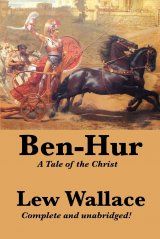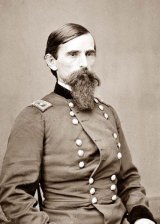Ben-Hur Page #6
Ben-Hur: A Tale of the Christ is a novel by Lew Wallace, published by Harper and Brothers on November 12, 1880, and considered "the most influential Christian book of the nineteenth century". It became a best-selling American novel, surpassing Harriet Beecher Stowe's Uncle Tom's Cabin in sales.
camel, and thence was led to Bagdad, not waiting for caravans. Alone I traveled, fearless, for the Spirit was with me, and is with me yet. What glory is ours, O brethren! We are to see the Redeemer--to speak to him--to worship him! I am done." CHAPTER V The vivacious Greek broke forth in expressions of joy and congratulations; after which the Egyptian said, with characteristic gravity: "I salute you, my brother. You have suffered much, and I rejoice in your triumph. If you are both pleased to hear me, I will now tell you who I am, and how I came to be called. Wait for me a moment." He went out and tended the camels; coming back, he resumed his seat. "Your words, brethren, were of the Spirit," he said, in commencement; "and the Spirit gives me to understand them. You each spoke particularly of your countries; in that there was a great object, which I will explain; but to make the interpretation complete, let me first speak of myself and my people. I am Balthasar the Egyptian." The last words were spoken quietly, but with so much dignity that both listeners bowed to the speaker. "There are many distinctions I might claim for my race," he continued; "but I will content myself with one. History began with us. We were the first to perpetuate events by records kept. So we have no traditions; and instead of poetry, we offer you certainty. On the facades of palaces and temples, on obelisks, on the inner walls of tombs, we wrote the names of our kings, and what they did; and to the delicate papyri we intrusted the wisdom of our philosophers and the secrets of our religion--all the secrets but one, whereof I will presently speak. Older than the Vedas of Para-Brahm or the Up-Angas of Vyasa, O Melchior; older than the songs of Homer or the metaphysics of Plato, O my Gaspar; older than the sacred books or kings of the people of China, or those of Siddartha, son of the beautiful Maya; older than the Genesis of Mosche the Hebrew--oldest of human records are the writings of Menes, our first king." Pausing an instant, he fixed his large eves kindly upon the Greek, saying, "In the youth of Hellas, who, O Gaspar, were the teachers of her teachers?" The Greek bowed, smiling. "By those records," Balthasar continued, "we know that when the fathers came from the far East, from the region of the birth of the three sacred rivers, from the centre of the earth--the Old Iran of which you spoke, O Melchior--came bringing with them the history of the world before the Flood, and of the Flood itself, as given to the Aryans by the sons of Noah, they taught God, the Creator and the Beginning, and the Soul, deathless as God. When the duty which calls us now is happily done, if you choose to go with me, I will show you the sacred library of our priesthood; among others, the Book of the Dead, in which is the ritual to be observed by the soul after Death has despatched it on its journey to judgment. The ideas--God and the Immortal Soul--were borne to Mizraim over the desert, and by him to the banks of the Nile. They were then in their purity, easy of understanding, as what God intends for our happiness always is; so, also, was the first worship--a song and a prayer natural to a soul joyous, hopeful, and in love with its Maker." Here the Greek threw up his hands, exclaiming, "Oh! the light deepens within me!" "And in me!" said the Hindoo, with equal fervor. The Egyptian regarded them benignantly, then went on, saying, "Religion is merely the law which binds man to his Creator: in purity it has but these elements--God, the Soul, and their Mutual Recognition; out of which, when put in practise, spring Worship, Love, and Reward. This law, like all others of divine origin--like that, for instance, which binds the earth to the sun--was perfected in the beginning by its Author. Such, my brothers, was the religion of the first family; such was the religion of our father Mizraim, who could not have been blind to the formula of creation, nowhere so discernible as in the first faith and the earliest worship. Perfection is God; simplicity is perfection. The curse of curses is that men will not let truths like these alone." He stopped, as if considering in what manner to continue. "Many nations have loved the sweet waters of the Nile," he said next; "the Ethiopian, the Pali-Putra, the Hebrew, the Assyrian, the Persian, the Macedonian, the Roman--of whom all, except the Hebrew, have at one time or another been its masters. So much coming and going of peoples corrupted the old Mizraimic faith. The Valley of Palms became a Valley of Gods. The Supreme One was divided into eight, each personating a creative principle in nature, with Ammon-Re at the head. Then Isis and Osiris, and their circle, representing water, fire, air, and other forces, were invented. Still the multiplication went on until we had another order, suggested by human qualities, such as strength, knowledge, love, and the like." "In all which there was the old folly!" cried the Greek, impulsively. "Only the things out of reach remain as they came to us." The Egyptian bowed, and proceeded: "Yet a little further, O my brethren, a little further, before I come to myself. What we go to will seem all the holier of comparison with what is and has been. The records show that Mizraim found the Nile in possession of the Ethiopians, who were spread thence through the African desert; a people of rich, fantastic genius, wholly given to the worship of nature. The Poetic Persian sacrificed to the sun, as the completest image of Ormuzd, his God; the devout children of the far East carved their deities out of wood and ivory; but the Ethiopian, without writing, without books, without mechanical faculty of any kind, quieted his soul by the worship of animals, birds, and insects, holding the cat sacred to Re, the bull to Isis, the beetle to Pthah. A long struggle against their rude faith ended in its adoption as the religion of the new empire. Then rose the mighty monuments that cumber the river-bank and the desert--obelisk, labyrinth, pyramid, and tomb of king, blent with tomb of crocodile. Into such deep debasement, O brethren, the sons of the Aryan fell!" Here, for the first time, the calmness of the Egyptian forsook him: though his countenance remained impassive, his voice gave way. "Do not too much despise my countrymen," he began again. "They did not all forget God. I said awhile ago, you may remember, that to papyri we intrusted all the secrets of our religion except one; of that I will now tell you. We had as king once a certain Pharaoh, who lent himself to all manner of changes and additions. To establish the new system, he strove to drive the old entirely out of mind. The Hebrews then dwelt with us as slaves. They clung to their God; and when the persecution became intolerable, they were delivered in a manner never to be forgotten. I speak from the records now. Mosche, himself a Hebrew, came to the palace, and demanded permission for the slaves, then millions in number,
Translation
Translate and read this book in other languages:
Select another language:
- - Select -
- 简体中文 (Chinese - Simplified)
- 繁體中文 (Chinese - Traditional)
- Español (Spanish)
- Esperanto (Esperanto)
- 日本語 (Japanese)
- Português (Portuguese)
- Deutsch (German)
- العربية (Arabic)
- Français (French)
- Русский (Russian)
- ಕನ್ನಡ (Kannada)
- 한국어 (Korean)
- עברית (Hebrew)
- Gaeilge (Irish)
- Українська (Ukrainian)
- اردو (Urdu)
- Magyar (Hungarian)
- मानक हिन्दी (Hindi)
- Indonesia (Indonesian)
- Italiano (Italian)
- தமிழ் (Tamil)
- Türkçe (Turkish)
- తెలుగు (Telugu)
- ภาษาไทย (Thai)
- Tiếng Việt (Vietnamese)
- Čeština (Czech)
- Polski (Polish)
- Bahasa Indonesia (Indonesian)
- Românește (Romanian)
- Nederlands (Dutch)
- Ελληνικά (Greek)
- Latinum (Latin)
- Svenska (Swedish)
- Dansk (Danish)
- Suomi (Finnish)
- فارسی (Persian)
- ייִדיש (Yiddish)
- հայերեն (Armenian)
- Norsk (Norwegian)
- English (English)
Citation
Use the citation below to add this book to your bibliography:
Style:MLAChicagoAPA
"Ben-Hur Books." Literature.com. STANDS4 LLC, 2025. Web. 5 Feb. 2025. <https://www.literature.com/book/ben-hur_1675>.








Discuss this Ben-Hur book with the community:
Report Comment
We're doing our best to make sure our content is useful, accurate and safe.
If by any chance you spot an inappropriate comment while navigating through our website please use this form to let us know, and we'll take care of it shortly.
Attachment
You need to be logged in to favorite.
Log In